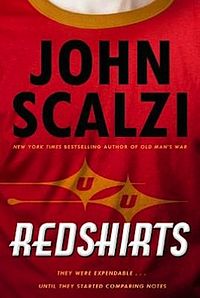Redshirts
by John Scalzi
In the prologue, several senior officers of the Intrepid, flagship of the Universal Union, lament the unusually high number of casualties of low-ranking crew members during recent away missions and conclude that they will need more crewmen to replace them.
Docking at a spaceport, the Intrepid takes on five new ensigns including Andrew Dahl, an expert in alien religions and xenobiology; Dahl quickly discerns that the crew is extremely phobic of being near the senior officers and of going on away missions due to their unusually high fatality rate. Over the course of several away missions, various crew members suggest that the deaths are due to incompetence, superstition, or cosmic forces, requiring "sacrifices" of some crew members so that others will survive.
After several close calls, Dahl meets Jenkins, a crew member who offers a different theory: their reality and timeline are under periodic influence of a badly written television show from the past. As the writers create the plot, characters' free will temporarily ceases in order to progress "the Narrative" of the show. This is why otherwise good officers occasionally seem incompetent, Ensigns make poor decisions, and the ship has mysterious technology on board to produce last-minute inventions and medicines which would otherwise be impossible to produce. Jenkins explains that with Dahl and the other Ensigns' otherwise routine duties, their colorful histories will inevitably make them targets of "the narrative" when the writers need "glorified extras" to kill for emotional impact.
The Ensigns kidnap a senior officer and proceed to travel to the past with the mission of convincing them to stop the show. Once there, they meet their actor doubles and realize that they are exact parallels, down to their scars and skin blemishes. Even their imagined backstories became integral events of the Ensigns' lives. Using this to their advantage, Dahl strikes a deal with the show's producer and head writer, who happens to be Jenkins' double, to save the life of the producer's comatose son by switching him with his crew member extra, one of the crew members is effectively his identical twin, and will revert to the young man's personality by staying in the past. Conversely, Dahl reasons that bringing the comatose son into the future will allow them to use "the Narrative" to their advantage, letting the advanced technology and reality-altering properties of the writing revive him.
Dahl and the Ensigns return to the future and live out the new revised plot created by the head writer, which includes saving the "injured crewman" they had on board. While saving the ship, Dahl sacrifices himself to save a senior officer for the sake of the narrative. Awakening later, Dahl receives a message from the writers and producers explaining his recovery, and they promise to make the lives of the crew meaningful instead of using death as a quick plot device. Dahl then compares the close calls he has had with those of the TV show's protagonists, and deduces that there is another narrative protecting him, which means that he is actually the protagonist of another story.
The novel features three epilogues. In the first one the head writer deals with writer's block as a consequence of his bad writing choices. In the second one the producer's son, having reverted to his personality from the crewman who switched with him, determines to do something useful with the second chance at life he's been given. In the third one an actress, who once played an extra on the show, receives a message showing intimate details of the woman whose life—and death—she helped create. She memorializes her lost "sister" on a beach and meets the head writer of the show, with both realizing that their characters on the show were married.
